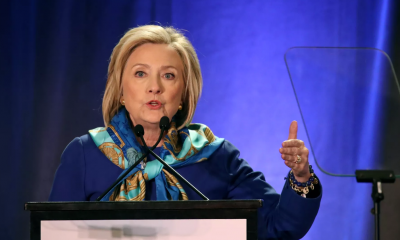World
Richard Verma’s confirmation hearing as India envoy set for Dec 2

Washington: The Senate Foreign Relations committee has scheduled the confirmation hearing of  President Barack Obama’s nominee to be US Ambassador to India, on Dec 2.
President Barack Obama’s nominee to be US Ambassador to India, on Dec 2.
If confirmed by the full Senate, Verma, 45, a former key aide to then secretary of state Hillary Clinton, will be the second Indian American to be put in charge of a job involving India.
Current Assistant Secretary of State for South and Central Asian Affairs, Nisha Desai Biswal, hailing from Prime Minister Narendra Modi’s home state of Gujarat, became the first Indian American to head the South Asia bureau last November.
The New Delhi post has been vacant since the previous ambassador Nancy Powell quit in May after India-US ties hit a low after a major diplomatic spat over the December arrest and strip search of Indian diplomat Devyani Khobragade in New York.
Kathleen Stephens, a career foreign service official has served as chargé d’affaires in New Delhi since July.
Verma was named as the US envoy to India just ahead of Modi’s visit to the US last September.
The scheduling of his confirmation hearing immediately after the Thanksgiving holidays is seen as an effort to see him in place before Obama’s second visit to India.
Obama has been invited by Modi to be the chief guest at the annual Republic Day parade, the first US President to have the honour. He would also be the first US chief executive to visit India twice while in office.
Last week, Secretary of State John Kerry had urged the Senate leadership to clear 55 pending ambassadorial nominations arguing ir is having an impact on American diplomacy globally.
Currently, Verma is a senior counsellor at the Steptoe & Johnson law firm and the Albright Stonebridge Group, a business advisory company led by former secretary of state Madeleine Albright.
Verma is also a Senior National Security Fellow at the Centre for American Progress and serves on the boards of Human Rights First, the Clinton Foundation and the National Democratic Institute.
A Lehigh University graduate who received a JD from American University, and an LL.M from Georgetown University Law Centre, Verma served as assistant secretary for legislative affairs at the State Department from 2009 to 2011 under Hillary Clinton.
He was also senior national security advisor, counsel and foreign policy advisor to the Senate Majority Leader Harry Reid from 2002 to 2007, and an associate at Steptoe & Johnson from 1998 to 2002.
Verma served on active duty in the US Air Force from 1994 to 1998 and received, among other decorations, the Meritorious Service Medal and Air Force Commendation Medal. Verma also served on the Commission on the Prevention of Weapons of Mass Destruction Proliferation and Terrorism in 2008 and has been a member of the Secretary of State’s Foreign Affairs Policy Board.
World
Lockdowns in China Force Urban Communities to Defy Censorship and Vent Frustration Online

Shanghai’s rich middle class is leading a wave of online dissent over the strict and prolonged lockdowns imposed in various parts of the country. Chinese internet censorship is struggling as patience is wearing thin in many urban centers, coming up with creative forms of online protests.
Social Media Posts Revealing Lockdown Tension in Shanghai
Drawn-out lockdowns are nothing new in China as authorities insist with the nation’s zero-Covid policy since the start of the pandemic. Currently over This time around, however, metropolitan areas like Shanghai are increasingly difficult to keep quiet, given that its more than 25 million residents have seen weeks of total isolation along with food shortages and many other service interruptions.
Dozens of towns and reportedly over 300 million Chinese citizens have been affected by lockdowns of different severity. As expected, urban netizens have been most outspoken over their difficulties by finding creative ways to get around state censorship and bans placed on topics, news comments and spontaneous campaigns.
Shanghai residents have been using mobile proxies and hijacking seemingly unrelated hashtags to talk about healthcare issues, delivery failures and the overall severity of their situation. The “positive energy” that the Chinese government wants to transmit during the recent prolonged series of lockdowns does not come naturally to those counting food supplies and online censors are working hard to filter words, trending topics and undesired social media sharing.
WeChat groups and message threads are under constant monitoring. Posts questioning the zero-Covid approach have been quickly deleted, including by leading Chinese health experts like Dr. Zhong Nanshan. Video footage is soon censored and protests and investigations are quickly made to disappear.
Where this has not worked, officials have exposed banners with warnings and outright threats like “watch your own mouth or face punishment”, while drones have been patrolling the city skies. Yet, if anything, this has led to further tensions and unspoken confrontation with Shanghai’s educated and affluent middle class.
Creative Online Solutions Harnessing Civic Energy
Announcements by Chinese social media that they would be publishing the IP addresses of users who “spread rumors” have not helped either. Tech industry research has shown that much of Asia’s tech-savvy population has a habit of using mobile proxies and other privacy tools, quickly finding workarounds to browse the internet freely and talk to the world about the hottest topics.
The sheer volume of forbidden posts is already a challenge for the very censorship system, experts explain. Unable to track all trending hashtags, state workers overlook topics that speak about the US, Ukraine or other popular news. Linking human rights elsewhere to their situation, Chinese online dissidents establish their informal channels and “hijack” the conversation to share personal or publicly relevant information about the Covid suppression in their town.
Sarcastic and satirical posts still dominate. Others hope to evade the censors by replacing words from famous poems or the national anthem. One thing is certain – social media, when harnessed with the right creativity, has proven its ability to mount pressure on the government in even some of the most strictly controlled tech environments like China.























